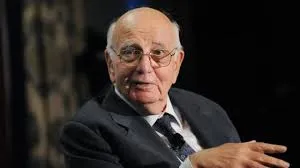 BrokerHiveX
BrokerHiveXBasic Information
Name: Paul Volcker
Identity: Former Chairman of the Federal Reserve | Expert in macroeconomics and monetary policy Specialties: Inflation control, monetary policy, financial regulation
Paul Volcker is one of the most influential central bankers in American and global financial history, renowned for his resolute anti-inflation policies in the early 1980s. A graduate of Princeton University, he studied at Harvard Kennedy School and continued his research in economics and public policy at the London School of Economics. Earlier in his career, Volcker worked at the Federal Reserve Bank of New York and the U.S. Treasury Department before serving as Chairman of the Federal Reserve from 1979 to 1987.
During his tenure, he decisively implemented a tight monetary policy, successfully curbing chronically high inflation through significant interest rate hikes, and laying the foundation for the long-term stability of the U.S. economy. His iron-fisted approach not only changed the trajectory of the U.S. economy but also profoundly influenced global monetary policy and financial markets.
Representative achievements
Chairman of the Federal Reserve from 1979 to 1987, known for the "Volcker Shock"
Decisive implementation of high interest rate policy successfully reduced the US inflation rate from double digits to a controllable range
Emphasize the independence of the central bank and defend monetary policy from political pressure
After the 2008 financial crisis, the Volcker Rule was proposed and promoted to restrict banks’ proprietary trading and strengthen financial supervision.
Known as the "inflation fighter", he is one of the most iconic figures in the history of modern monetary policy.
Investment Philosophy
“The primary responsibility of a central bank is to maintain monetary stability. Without a stable currency, there can be no healthy economy.”
Paul Volcker firmly believed that the long-term health of the macroeconomy depended on a stable monetary environment. He emphasized that central bank policy should be centered on controlling inflation and maintaining a sound financial system , and that long-term stability must be firmly upheld, even at high short-term costs. His philosophy not only shaped the tradition of monetary policy in the United States but also became a key reference for central banks worldwide.
